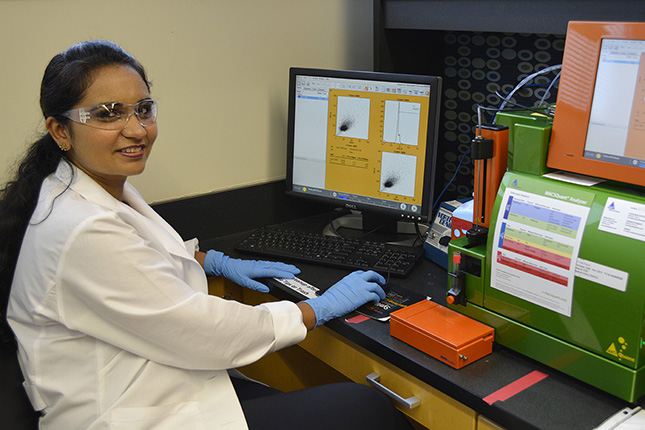
Tell me about your background.
I am from India. I did my Masters in Biotechnology and PhD in Cancer Biology from the All India Institute of Medical Sciences (AIIMS), New Delhi, India. During my PhD, I received a fellowship to perform research as an Exchange visitor at the German Cancer Research Center (DKFZ), Heidelberg, Germany.
What led you to study at Washington University?
Washington University is a large, research university committed to its tripartite academic mission of excellence in patient care, teaching, and cutting-edge research. The University is an ideal venue for the mentored training needed to succeed in academic research. After my PhD, my goal was to gain further training and expertise in translation cancer research which can directly benefit cancer patients. I was excited to join Dr. Hallahan’s lab in Washington University as his lab primarily focuses on translational cancer research.
What are your future career goals?
My goal is to expand my scientific expertise and training experience to transition to a successful independent investigator committed to cancer research, which will make substantial contributions in therapeutics of cancer. As an independent investigator I would like to focus on devising strategies to improve survival of cancer patients and reduce the side-effects of conventional cancer therapies.
Tell me about your research.
Cancer specific targeting sparing normal tissues would significantly enhance cancer therapy outcomes and reduce cancer-related mortality. One approach is to target receptors and/or molecules that are specifically expressed on cancer cells. In this project we used peptides as cancer-specific targeting agents. We targeted Glucose regulated protein 78 (GRP78) which is an endoplasmic reticulum stress chaperone that regulates the unfolded protein response and is over expressed in various cancers. We evaluated GIRLRG peptide that specifically targets GRP78 for cancer specific binding (in vitro) and non-invasive tumor imaging (in vivo). We found that GIRLRG peptide specifically binds to the ATPase domain of GRP78. Radiolabeled PEG-GIRLRG could be used to target various cancers. This research was published in the Journal of Nuclear Medicine (read full text article).
You received an award from the Journal of Nuclear Medicine for the work that you discussed in your publication. What was that experience like?
Receiving the Alavi-Mandell award from the Journal of Nuclear Medicine was a big surprise for me. When I first saw that email, I thought it might be “spam”. Then I read through it and saw the attached award letter, that’s when I realized it was real! The email stated that I received this award for my contribution to cancer research and I was thrilled to read it. This recognition is very encouraging for a budding scientist like me. It made me more enthusiastic about my research and I feel more dedicated to work towards contributing to the field of cancer detection and therapeutics.
What has been the most challenging aspect of this project?
The most challenging aspect has been to optimize the PEG-GIRLRG peptide to improve its long-term biodistribution. We are working on optimizing the binding affinity of this peptide to GRP78 so that it binds specifically to cancer and not normal tissues. This is a big challenge in cancer therapeutics as most of the current cancer targets are also expressed on normal tissues. We are also working on improving the microscopic biodistribution of the peptide throughout the tumor.
Was there something in particular that led you to this subject of research?
We had previously published that GIRLRG peptide targets irradiated tumors in mice. We further wanted to characterize the potential of this peptide as an imaging agent and a carrier for therapeutic agents to specifically target cancer and spare normal tissues.
What are your future plans for this study?
Our study offered support for surface GRP78 as a peptide receptor and a molecular target for development of diagnostics and therapeutics for various cancers. Our long-term aim is to develop GIRLRG peptide as a carrier for therapeutic agents. In this study, we showed specifically that GIRLRG binds to GRP78 on the surface of cancer cells, and this could be a potential peptide for targeting various cancers like cervical, esophageal, lung, glioma and pancreatic. Presently PEG-GIRLRG is being further optimized to improve the long-term bio-distribution and being prepared for preclinical efficacy and safety testing before moving it to clinical trials.
Vaishali Kapoor is a member of the Hallahan Lab.